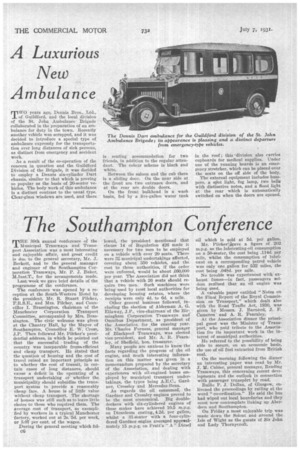The Southampton conference
Page 104

If you've noticed an error in this article please click here to report it so we can fix it.
THE 30th annual conference of the Municipal Tramways and Transport Association was a most interesting and enjoyable affair, and great credit is due to the general secretary, Mr. J. Beckett, and to the general manager and engineer of the Southampton Corporation Tramways, Mr. P. J. Baker, M.Inst.T., for the arrangements made.
Last week we gave brief details o the programme of the conference.
The conference was opened by a reception at the South-Western Hotel by the president, Mr. R. Stuart Filcher, F.R.S.E., and Mrs. Filcher, and Councillor I. Brassington, chairman of the Manchester Corporation Transport Committee, accompanied by Mrs. Brassington. The civic welcome was given at the Chantry Hall, by the Mayor of Southampton, Councillor E. W. Cross, J.P. Then followed Mr. Filcher's presidential address, in which he pointed out that the successful • trading of the country was inseparable fromsefficient and cheap transport. He Stated that the question of housing and the cost of travel raised an important principle as to whether the cost of transit, in certain cases of long distances, should cause a deficit in the operating of a transport undertaking or whether the municipality should subsidize the transport system to provide a reasonably cheap fare. A house is of little value without cheap transport. The shortage of houses was still such as to leave little choice,to those who required them. The average cost of transport, as exemplified by workers in a typical Manchester factory, worked out at 2s..5d. per week, or 5.07 per cent, of the wages.
During the general meeting which folC6 lowed, the president mentioned that clause 14 of Regulation 426 made it necessary for two men to be employed on a vehicle with over 20 seats. There were 32 municipal undertakings affected, covering about 350 vehicles, and the cost to those authorities, if the order were enforced, would be about £60,000 per year. The Association did not think that a vehicle with 26 seats should require two men. Such machines were being used by most local authorities for developing housing estates, where the receipts were only 4d. to 6d. a mile.
Other general business followed, including the election of Alderman A. G. Ellaway, J.P., vice-chairman of the Birmingham Corporation Tramways and Omnibus Department, as president of the Associatiot, for the ensuing year. Mr. -Charles Farness, general manager of Blackpool Tramways, was elected vice-president, and Mr. A. R. Fearnley, of Sheffield, hon. treasurer.
Many people are anxious to know the facts regarding the progress of the oil engine, and much interesting information on this matter was given in a memorandum prepared by the secretary of the Association, and dealing with experiences with oil-engined buses employed by municipal transport undertakings, the types being A.E.C., Gardner, Crossley and Mercedes-Benz. As regards the oil consumed, the Gardner and Crossley engines proved to be the most economical. Big doubledeckers with six-cylindered engines of these makes have achieved 10.5 m.p.g. on Diesoleum costing, 4.2d. per gallon, whilst a 31-seater with a four-cylindered Gardner engine averaged apprioximately 15 m.p.g. on Pratt's " A" Diesel oil which is sold at 5d. per gallon. Mr. Pilehee•jgave a figure of 202 m.p.g. as the lubricating-oil consumption on a 50-seater, the cost being .114d. per mile, whilst the consumption of lubricant on a corresponding petrol vehicle was only one .gallon for 532 miles, the cost being .048d. per mile.
No trouble was experienced with exhaust fumes—in fact, passengers seldom realized that an oil engine was being used.
A valuable paper entitled "Notes on the Fine./ Report of the Royal Commission on Transport," which dealt also with the Road Traffic Act, 1930, was given by Messrs. T. Barnard, J. P. Cameron and A. R. Pearnley.
At the Association dinner the principal pest was the Minister of Transport, who paid tribute to the Association for its important work in the interest of municipal authorities.
He referred to the possibility of being able to secure, on an economic basis, the use of oil fuel extracted from British coal.
On the morning following the dinner an interesting paper was read by Mr. J. M. Calder, general manager, Reading Tramways, this concerning recent developinents and the outlook in connection with passenger transp6rt by road.
Bailie P. j. Dollan, of Glasgow, en• livened the proceedings by railing at the word "co-ordination." He said the bus had wiped out local boundaries and they must now contemplate linking up Aberdeen and Southampton.
On Friday a most enjoyable trip was made down the Solent and around the Isle of Wight as the guests of .Sir John and Lady Thornycroft.




























































































































































